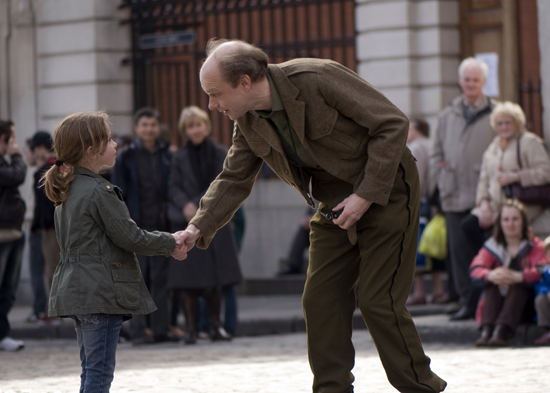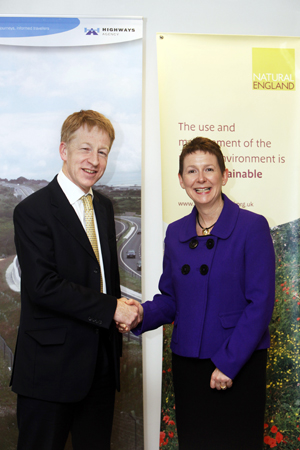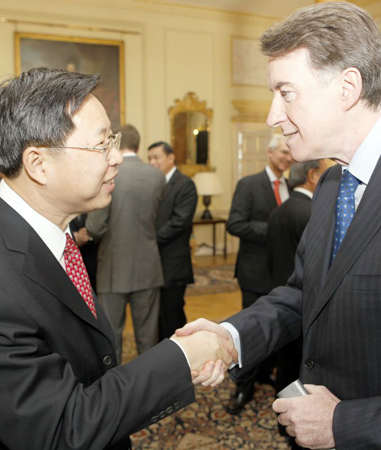Culture and Society: Greetings and Courtesies
General
British greetings tend to reflect the conservative formality of the society. The British are extremely polite, and reserve does not constitute coldness. They are, however, usually suspicious of extremes, preferring calm reserve in both behavior and emotion to overtly enthusiastic or emotional displays. The British value a large degree of privacy and care should be taken to preserve both personal space and personal information.
Informal Greetings
The standard greeting in the UK is the handshake for both men and women. Men shake hands somewhat firmly, taking care to use a lighter touch when greeting a woman and waiting for her to extend her hand first. Friends who know each other well will also sometimes give an "air-kiss" while touching cheeks, usually on just one side, and some British people have adopted the two-cheek air-kiss from parts of continental Europe. When uncertain, a British person will typically use a handshake so as not to invade personal space, especially among older generations.
In general, the British reserve informal greetings for friends and family. First names are used in informal situations. The typical informal greeting in most situations is "Hello" or "Hi" followed by "How are you?" In a private and reserved society, this is not an actual inquiry into the other person’s health, and should not be answered as such. Rather, the appropriate response is "Fine, thank you. And how are you?"
The British frequently use terms of endearment with family, friends, and even acquaintances, depending on the region. These include "love," "duck," "dearie," and "mate." However, it would be considered odd for a foreigner to apply one of these terms to a local.
In casual settings, a British person may say "Morning," "Afternoon," or "Evening," dropping the preceding "Good." These are used equally to mean "Hello" and "Good-bye." In still more casual situations, the questions "How are things?" or "You OK?" are responded to in kind—"Yeah, not bad!"
For informal introductions, a handshake and "Nice/lovely to meet you!" is the norm. This is responded to in kind, and leave-taking from such a situation calls for the phrase, "Nice to have met you!" Other informal farewells are "Bye," "Take care," and "Cheers," which in the UK generally means '"Thank you," but in the case of leave-taking means more literally, "Bye, and thanks!"
Formal Greetings
Formal greetings are used with those who are not family or friends, typically involving a handshake for both men and women. The British consider it polite to stand when greeting someone.
A British person greeting someone formally will use polite language, including surnames or titles. Correct forms of address include Mr., Mrs., Miss, Dr., Professor, Colonel, etc., followed by the person’s surname. Titles specific to the British include those of knights and dames. If a man has been knighted by the throne, he may be referred to as Sir Lawrence in speech or Sir Lawrence Olivier in writing, but not Sir Olivier. His wife, however, would be addressed as Lady Olivier. Likewise, Dame Judi Dench may also be referred to as Dame Judi but not Dame Dench. However, a visitor being introduced to a knight or dame should take cues from the mutual acquaintance making the introduction as to how to refer to that person.
Introductions are usually made by a mutual friend, but if none is available it is polite to ask, "May I introduce myself?" First meetings in a formal setting may be accompanied by "How do you do?" along with a handshake. Again, this not an inquiry after the person’s health and should not be answered as such. The proper response is to return the phrase—"How do you do?" This is quite formal and seldom used by younger generations. The more common exchange after an introduction in a formal setting is "Pleased to meet you." Formal leave-taking usually involves another handshake and the phrase "It was nice/lovely to have met you. Good-bye."
Business greetings
Business greetings follow the protocol for formal greetings. The phrase How do you do? may be used more often in business as opposed to social settings and should be responded to in kind. Business associates refer to each other by title and surname (e.g., Mr. Johnson) unless true familiarity has been established. Business cards are exchanged at meetings as a way to maintain future contract, but are not given particularly special treatment.
Conversation Topics
For a society in which it can be difficult to express one’s emotions, the British, who are reserved but not necessarily serious, appreciate irony and humor, enjoy peppering conversations with both, and appreciate others who do so as well. Care should be taken, however, in choosing conversation topics.
The quintessential topic of conversation in the UK is the famously unpredictable weather. Thus the weather, which is discussed more frequently in Britain than any other subject, is usually the best place from which to begin a conversation. Typical polite conversations begin with questions or comments such as "Lovely weather today!" or "Bit windy, isn’t it?" The addressed person responds with a similar comment and then indicates whether continued conversation is welcome by either continuing with or closing the topic. Bad weather is often complained of but usually met with a degree of optimism—"Never mind, the rain is good for the garden."
Sport—in particular, football (soccer)—and current events also make good topics of conversation, and the British appreciate it if people are well-informed in these topics, especially current events. British history, art, literature, culture, food, and ale are also good topics.
Taboos
It is considered bad form to address someone by his or her first name, especially in a business setting, unless a great degree of familiarity has already been established. Using informal language in professional situations is considered downright rude and can sometimes be a deal-breaker in negotiations. Business and business discussions are confined to working hours, and personal time is not used for business.
Eye contact is often not held during conversation, and care should be taken to preserve a British person’s personal space. Overtly staring at someone while conversing, or staring at anyone in public, is considered rude and an invasion of personal space.
Citizens of UK countries—England, Scotland, Wales, and Northern Ireland—are proud of their differing heritages and histories and dislike being generalized or grouped together. Referring to a person as English, Scottish, Welsh, or Northern Irish should be avoided unless one is sure of a person’s background, as mistakes can cause offense.
As the British are culturally reserved, idle conversation is frowned upon, especially in large cities, and protective barriers such as newspapers will be used to indicate that it is unwelcome. Those wishing to initiate conversations with strangers typically start the conversation with a question and follow the other person’s cues. In vastly multicultural London especially, care is taken when choosing a conversation topic, as backgrounds and nationalities vary a great deal and assumptions about someone's origins or circumstances can be offensive. In general, personal questions such as someone’s family matters or income are considered private and are avoided.
International affairs are generally be avoided in conversation, especially those in regard to Northern Ireland and the IRA, the Middle East, and the European Union, as these can be considered volatile subjects. Questions about the monarchy and the Royal Family, social class, religion, partisan politics, and race or immigration may be interpreted as rude and ill-informed if not ill-bred.
Article written for World Trade Press by Heather Thielen.
Copyright © 1993—2024 World Trade Press. All rights reserved.

 United Kingdom
United Kingdom 


